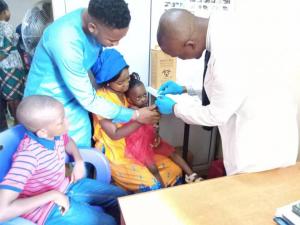Government strives to make medication, support available for HIV-positive children
Abuja, 29 October, 2019 - Five-year-old Hadiza Malami* and her siblings were born with human immunodeficiency virus (HIV). Hadiza’s parents, who are both HIV positive, only started receiving antiretroviral (ARV) treatment a year after Hadiza’s birth when an HIV testing and treatment centre opened in their neighbourhood.
“I wish I knew about ARVs and proper management of HIV before I gave birth to Hadiza,” says her mother, Aminatu Malami*.
“I’m glad we enrolled when the treatment centre opened in our neighbourhood. We now all have access to regular ARVs and we have been managing our condition very well for the past four years,” she adds. “We’ve been told the viral load in our bodies is undetectable too. I’m happy!”
Fortunately for other parents of children like Hadiza, the continued efforts of the Nigerian government with support from development partners has resulted in increased availability of treatment sites for the management of HIV.
The government-owned treatment centre where Mrs Malami and her family receive their ARVs has over 300 patients. In addition, the government is working with the United States President's Emergency Plan for AIDS Relief (PEPFAR) and the Global Fund to provide free testing, counselling and ARV treatment to people in Nigeria.
Controlling HV
“HIV is a disease that the Nigerian government is keen to control and possibly eliminate,” says Mr Araoye Segilola, national coordinator for the National AIDS and Sexually Transmitted Infections Control Program (NASCP).
“Furthermore, the Nigerian government is intensifying its search for children living with HIV and improving their access to care,” he adds.
To this end, the government is currently piloting a data collection service in the Federal Capital Territory that uses mobile phones to track testing and follow-up care.
Almost 380 000 Nigerian children age 0-14 years are living with HIV, a rate of 0.2%, according to National HIV/AIDS Indicator and Impact Survey (NAIIS) data released in March 2019.
So far, a total of 8 373 HIV testing and counselling centres have been created in Nigeria; 6 301 Prevention of Mother to Child Transmission (PMTCT) programme centres have been set up; and a total of 1 639 ART centres have opened. Nigeria aims to have 95% of health facilities providing PMTCT services by 2021 to effectively curb this type of HIV transmission.
Achieving Sustainable Development Goal Targets
The HIV response in Nigeria is primarily funded by PEPFAR, the Global Fund and the Nigerian government with technical support from the World Health Organization (WHO).
WHO is committed to providing the assistance needed to achieve the targets for communicable and non-communicable diseases set out under the 2030 Sustainable Development Goals.
“WHO is providing evidence-based guidance and recommendations to eliminate transmission of HIV and other communicable diseases, especially for children and vulnerable populations,” says Dr Funke Ilesanmi, WHO Nigeria focal person for HIV. “WHO will continue to build the capacity of the government to deliver high-quality HIV services, and support Nigeria in overcoming HIV and other communicable diseases.”
*Names have been changed to protect identifies.
Technical Contact:
Dr Funke Ilesanmi; Tel: +234 903 722 8596; Email: ilesanmio [at] who.int (ilesanmio[at]who[dot]int)



